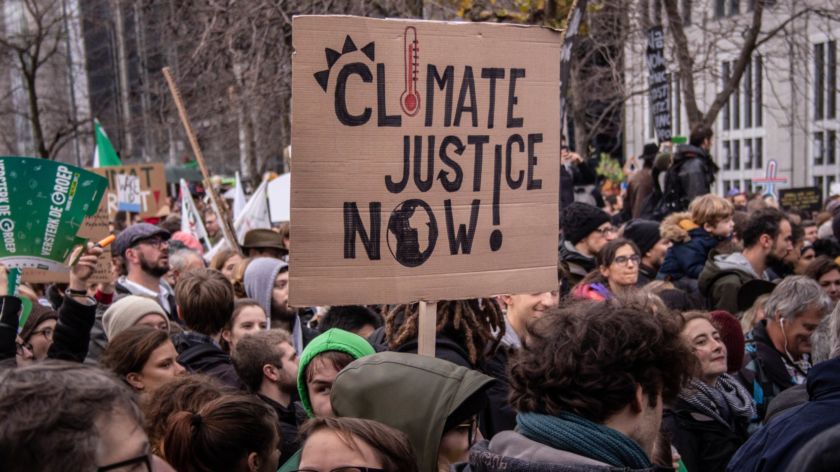How climate change and gender are related
-
 Een klimaatprotest in Brussel. Foto: Pelle De Brabander (cc)
Een klimaatprotest in Brussel. Foto: Pelle De Brabander (cc)
Today, lecturer Irene Dankelman gives her farewell lecture on how gender, sustainability and climate change are related to each other. Because climate change is likely to affect women, children, the elderly and disadvantaged the hardest. ‘It is our duty to stay positive’.
More often than not you find that people who are active in gender discussions are also very concerned about the environment. Radboud lecturer Irene Dankelman studied how gender and climate change relate to one another and what comes first: the chicken or the egg? Does climate change affect gender inequality, or vice versa, or both?
How can we discuss climate change and not give a voice to half of the population? According to UN reports, climate change will affect women, children, the elderly and the disadvantaged much harsher than those in power – those who control the resources.
Dankelman researches this issue. She started her career as an ecologist, but when in 1985 she attended a Women’s UN conference, she witnessed the first international discussion of women’s role in environmental issues. This changed her perception of ecology and her place within it. ‘During that time, I was often the only woman in the room’, says Dankelman. ‘There has been much improvement in that regard since, but there is still a long way to go.’
Educating women
There are many initiatives that advocate gender equality as a component to fighting the adverse effect of climate change. For example, project Drawdown proposes addressing some of the contributors to global warming, like overpopulation. Enforcing controlling policies such as limiting the amount of children per woman is a very drastic and authoritative measure. Instead, a solution could be educating women, especially in developing countries, promoting sexual health education and the use of contraceptives. Research shows that the more educated a woman is, the less children she has.

Furthermore women are responsible for 60-80 percent of food production in developing countries. However, they do not always possess the knowledge or the resources as their male counterparts and therefore do not utilise the land in the most efficient way. Tackling this problem from the side of providing education and access to resources may well diminish cutting down forests for land needed for food production.
Yet Dankelman believes that simply educating will not be the only solution. She recalls a story about an initiative to build schools in the Himalayas. ‘It did not work because girls needed to work to support their families with collecting fuel and water, as resources are scarce in the region’, she says. Therefore the education was not the best approach in that case, without addressing the issues of labour and resources.
Holistic approach
To Dankelman, there is a direct link between women’s movements, justice and environment. After all, in many cultures the woman role is directly linked to nature, so why wouldn’t you include their voice in how we treat nature? ‘At last the world is more willing to recognize the necessity to hear ‘underprivileged’ voices’, says Dankelman. ‘It took much longer for minorities to be included in the sustainability discourse than in other discourses.’
Dankelman emphasizes: ‘Instead of victims they [women ed.] are actors now. Attitude towards the environment depends on people’s experiences and personalised dramas.’ In terms of climate change, gender determines the impact of workload, income inequality and natural disasters. Disadvantaged groups have a very different experience of the world, ‘local groups look more in the future’, says Dankelman. ‘This is why they can act as agents of change’.
Struggle
Yet, Dankelman cautions against putting the responsibility for the future of our planet onto the shoulders of women and other disadvantaged groups as they still have to go through ‘extra struggle to stop the destruction’. Dankelman believes it is just as important to change mindsets of advantaged groups. ‘We therefore need to construct a holistic approach that will allow everyone to build resilience against climate change effects.’
‘It’s our duty to stay positive,’ she says. After all, there are hundreds of students taking part in the climate marches all over the country, the International Women’s Day march, Gay Pride etc. This reinforces the role of higher education institutions as hubs of activism. In fact, Radboud University undertakes an active role as an observer in climate negotiations within UNFCC and therefore not only supports students who wish to make a difference in the world but takes part itself in the fight for our planet.
On what a student can do to actively advocate for change and she said: ‘Look for other people! It’s impossible to do this on your own, but together you can make a difference.’



